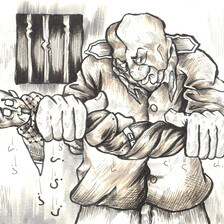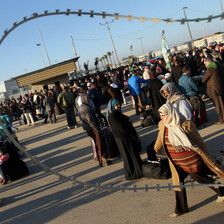The Electronic Intifada Jerusalem 27 August 2013

Israel forces Palestinians in East Jerusalem to demolish their own homes.
APA imagesZiad Ameira set a thick stack of papers on a plastic table. These official notifications and threats forced the 49-year-old convenience store-owner to destroy his own house in the Sur Baher area of East Jerusalem on 18 August.
“My family and I lived in that home for 13 years,” he said. “I have no idea where to go from here.”
Ameira had inherited the land where the house was built from his late father. Only twenty days after Ameira and his family moved into the home in 2000, the Israeli-controlled Jerusalem Municipality delivered a demolition order. In May this year, “they gave me the choice: I demolish my own house or they do it for me,” he told The Electronic Intifada. “They gave me two and a half months.”
The eight-member family is now living in two small rooms at his brother’s house. Despite the extreme circumstances, they won’t be able to stay there longer than a few months, as his nephew is getting married and needs the space. “I have three boys and two daughters, my wife and my mother,” Ameira said. “My mom is 85 years old and is no longer able to walk.”
Just fifteen years after he began building his family’s home with his own hands, Ameira was given the cruel choice of paying for Israel to raze it or bringing down its walls himself. He chose the latter.
When Israeli forces destroy Palestinian homes — whether in in the West Bank, including East Jerusalem, or within present-day Israel — the residents are told they have to foot the bill for the demolition.
The first court order which Ameira received back in 2000 informed him that he owed the municipality 35,000 shekels (approximately $10,000). “At that time, I was paying only around 500 shekels [$104] per month,” he said.
“But they kept fining me. After another two and a half years, they said I had to pay another 27,000 shekel [$5,600] fine. For a building permit, they wanted around 250,000 shekels [$52,000].”
As his convenience store provides a meager income, Ameira insisted that he had no real choice. In order to pay his lawyer, he had to borrow money.
“I wasn’t able to pay them that much. My children were small at the time and I had no one to help me. Even today, my store only brings in enough profit to pay for the family to eat.
“When we first moved into our home, because it lacked a permit, we had to buy water and electricity from the neighbors.”
“Beautiful with time”
He added that the family wasn’t able to afford to tile the house for the first four years, so they had to walk on a dirt floor.
“It was a cheap house, but we made it beautiful with time. We added a patio and a beautiful garden, and we did it all with our own hands.”
Ameira’s friends and family used to visit regularly, often sitting in the garden and chatting over tea into the early hours of the morning.
Each time a court order came by mail, it informed Ameira that Israeli authorities “reserved the right” to destroy his home at any moment. Despite his lawyer having delayed one for several years, a demolition order came in May 2013.
Ameira spent months preparing his children for the decision, and shortly after Ramadan ended, he began the process of destroying the home.
Though he avoided having to pay the municipality a $20,000 demolition fee, he still had to pay for the demolition. After renting a bulldozer and hiring a dump truck to haul off the remains of his home, the total costs exceeded $7,000.
New form of punishment
Though Israel’s home demolition policy is usually implemented by soldiers or police officers who arrive with bulldozers in the dead of night, Ameira said that this is one of Israel’s new forms of punishment for Palestinians.
“The law used to be that the Israeli authorities had to demolish the house, but that changed in recent years … so that Israel wouldn’t have media pressure,” he said.
The “self-demolition” policy is used frequently in East Jerusalem.
According to the Israeli Committee Against House Demolitions, nearly 380 Palestinian structures have been demolished so far this year, resulting in the displacement of 630 persons.
Of the roughly 270,000 Palestinians living under Israeli occupation in East Jerusalem, a Palestinian Counseling Center study found that more than 93,000 lived “at risk of being displaced by having their homes demolished” (“With our own hands,” January 2012 [PDF]).
The report adds that “the number of cases where Palestinians demolished their homes to evade fines or prosecution is believed to be only slightly below the number of homes demolished by Israeli authorities.”
A number of interviews with families forced to demolish their own homes found that “once they had been issued a demolition order … all of the families without exception saw the homes’ final destruction as inevitable, with no other possible resolution.”
Israeli policy aims to increase the number of settlers in East Jerusalem — already approximately 200,000 — by further entrenching the institutions of occupation. Integral to this project is pressuring the city’s indigenous Palestinian residents to leave by imposing a complex permit regime, demolishing homes and enforcing a legal system that discriminates against Palestinians.
“Biggest form of racism”
“All of us were born in Jerusalem; my entire family is originally from Jerusalem,” Ameira said.
“I’ve never been interested in politics, but it’s clear that Israel wants to kick all of us out of Jerusalem,” Ameira said. “They are telling us, that’s it, forget Jerusalem, forget al-Aqsa [mosque], forget everything here.”
Residents of Sur Baher struggle to maintain basic infrastructure as they are caged in by a road connecting Jerusalem to Israeli settlements in the West Bank. Since the 1970s, they have lost land to two of these settlements: Har Homa and East Talpiot.
Ziad Ameira’s 21-year-old-son, Mustafa, who had recently married and moved out at the time of the demolition, echoed his father’s sentiments: “They simply want to throw us out of our homeland. Where in the world are people forced to destroy their own homes?”
Turning to his father, Mustafa added, “It’s the biggest form of racism in the world. I’ve never heard of an Israeli having to demolish his own home.”
The elder Ameira expressed his pessimism regarding the ongoing “peace” talks between Israel and the Palestinian Authority. Although Sur Baher falls within the part of East Jerusalem that may go to a Palestinian state in the unlikely event of a brokered two-state solution based on the pre-1967 War boundaries, he fears a future of more demolitions and land theft.
“If Israel was going to give us the ’67 borders, then why are they destroying homes?” he asked. “They’ve changed the people and geography of Jerusalem so much that it’s impossible. They want our land without the people.”
Though Ziad Ameira accused the Palestinian Authority of breaking its promises to support Jerusalem families struggling to stay in their homes and on their lands, he pledged to stay in the city “until the end,” adding “I could go get a tent and set it up on my land or on the side of the street, but the municipality would probably destroy that, too.
“I’m asking the people of the world who are able, help us — not just me, but all of Jerusalem … We want to stay on our land, but we can’t take this forever. It’s too much tragedy.
“We’re scared of the future. Our future is black and we don’t know what the end will be. There’s no light at the end of the tunnel.”
Patrick O. Strickland is an investigative reporter for Mint Press News. His writing has appeared at Al Jazeera English, Truthout, AlterNet, and elsewhere. Follow him on Twitter: @P_Strickland_.




